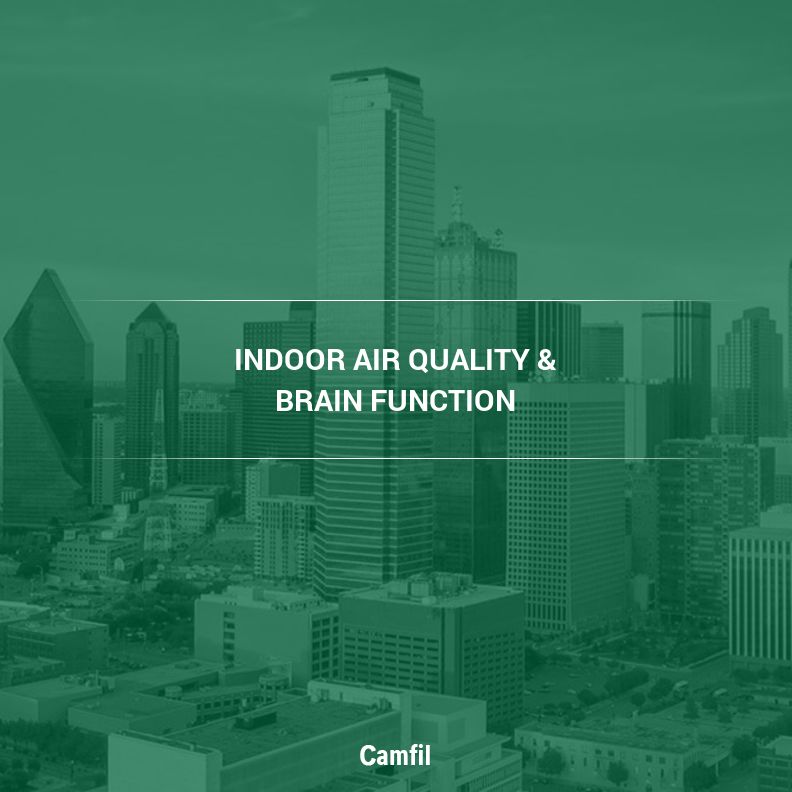Learn why poor indoor air quality is a problem for productivity and find out how commercial air filtration systems can help fix it.
Air pollution as a concept is often associated with the air outdoors. For example, when there’s a wildfire, people are advised to stay indoors to avoid smoke inhalation. The same thing happens during atmospheric inversions when cold air laden with pollution is trapped close to the ground by a layer of warm air above. Even buildings near major roads and freeways are advised to keep road-facing windows closed to prevent pollution from coming inside. Not surprisingly, concerns about polluted outdoor air have led to increased interest in high efficiency air filter product.
But there’s another factor to consider. Pollution can also come from indoor sources. In offices, for example, furnishings like tables and cabinets can release volatile organic compounds (VOCs) into the air, causing indoor air quality problems. This is often due to how inexpensive wood furniture is made using glue that contains formaldehyde. Controlling VOCs requires another type of filter known as a molecular filter.
The Relationship Between Energy Efficiency and Indoor Air Quality
Another reason poor indoor air quality has become such a big problem is due to how some buildings were designed in the recent past The oil crisis of the 1970s resulted in a trend of buildings being more airtight to improve their energy efficiency due to the large demand HVAC fans place on energy usage. The idea was that sealing up a building with better insulation and plugging leaks on doors and windows would prevent warm air from going outside and cold air from entering the building or vice versa.
This led to a problem called sick building syndrome, which the World Health Organization has since linked to poor indoor air quality.
More than forty years later, awareness has become far more widespread. But indoor air quality is something that still has to be managed by building managers, school administrators, and business owners. Buildings are dynamic environments, after all. The combination of multiple people exhaling CO2, off-gassing of furnishings, equipment, and even things like peoples’ clothes all have an impact on air quality.
The good news is that buildings have since moved on to having mechanical ventilation systems that force stale air out and push new air in. High efficiency particulate air filters ensure that throughout this process, airborne pollutants don’t circulate indoors.
High Efficiency Air Filters Should Play a More Important Role
Situations that allow fumes from undesirable substances to accumulate in indoor air are not unusual. According to the US Environmental Protection Agency (EPA), the average person spends about 90 percent of their time indoors, making it easy for them to inhale air pollution off-gassed by furnishings and from particulates from cooking, heating, and lighting. While high efficiency air filters have become more common, many buildings across the country continue to rely on low efficiency, low priced, air filters. Many commercial and retail facility managers do not even know what filters are protecting the air their occupants are breathing.
Apart from the widely recognized negative health effects of air pollution, studies have shown that poor indoor air quality in homes, schools, and offices can also affect productivity. In one study, low indoor air quality was linked to reduced worker productivity as well as lower scores and higher rates of absenteeism in schools.
Indoor Air Quality and Its Impact on the Brain and Body
One study on indoor air quality specifically looked at the effects of air quality on cognitive performance in the workplace. The researchers placed different groups of people into rooms that mimic regular office conditions, with some rooms having low concentrations of VOCs (similar to an office with low-emission furniture) and others having higher ventilation levels.
The study found that scores reflecting decision-making and critical thinking were higher in the well-ventilated rooms than those with VOCs. The researchers also found that the combination of high ventilation and low VOC levels was the most effective. In any case, it’s clear that having a mechanical ventilation system backed by industrial air filtration has obvious benefits for any workplace.
“Studies show that good indoor air quality has a positive effect on people’s productivity,” explains Mark Davidson, Manager of Marketing & Technical Materials at Camfil USA. “They’re more alert. They show better cognitive performance thanks to improved oxygen flow. And they can even gain better general health. This translates into fewer sick days and improved well-being.”
For Office Air Filter Systems, Look for Experienced Air Filter Manufacturers
If you are concerned about the air quality in your workplace, consider installing both a high efficiency particulate air filter and a molecular filter in your system. Look for experienced air filter manufacturers specializing in commercial applications to get the best results.
For more than 50 years, Camfil USA has built commercial air filtration systems for a wide variety of industries. Talk to our team to learn more about our air filter solutions today.
https://cleanair.camfil.us/locations/
The post Supporting Productivity with Commercial Air Filtration Systems appeared first on Air Filters for Clean Air.

